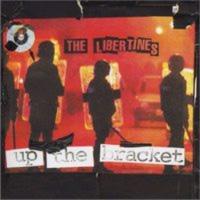Libertines 2002 Debut Gets To Returning Tracking Angle Writer McGill
The Libertines, on their debut album Up the Bracket album (issued in the UK, October, 2002, and March, 2003 in America), deliver well-written punk-pop in a ragged-but-right style that teases with echoes of The Clash, The New York Dolls and Pavement. Avoiding the polar pitfalls of Green Day's predictability and Modest Mouse's endless demands on the listener's patience, they thread the skinny needle of superb garage rock, coming out the other side grinning, sweaty, and deserving of your buying them a Guinness.
The album, produced by Mick Jones of the Clash and Bernard Butler of Suede, sounds good-raw and raunchy upstairs with the guitars and vocals, fat and solid down in the basement with the bass and drums. Detailed enough, but round enough too: exactly what you want with this kind of music. Vocals sound as natural as they ought to: a “small-club P.A.” sort of natural, bold and brash, with the occasional Strokes nasal-midrange vocal distortion for variety.
Joyous and energetic throughout, the album never lets up. The Libertines open with a bang: the sassy rocker “Vertigo,” featuring superb climbing-and-descending bass runs from John Hassall. The first four songs keep the momentum up, and you think you're simply on board for more good solid Hives/Vines/Jet early-2000s garage-psych-punk. But the band takes it to another level on tracks 5 through 7.
Let's start on #7 and go back: the title track is the most crisply played and arranged song on the record, a brisk rocker with great chord changes. An urgent-sounding minor-key intro explodes into a buoyant major verse, and we're off: great fast Buzzcocks/Jam-style power pop driven by the band's superb drummer, Gary Powell. (Those who don't know the latter two bands can perhaps picture instead fast hard Oasis, a la “Morning Glory.”)
Track 6, “Radio America,” is in a curious but delightful style that I'm going to call Acoustic Glam, because it reminds me so much of the New York Dolls' “Lonely Planet Boy,” Iggy's “Nightclubbing,” and the Replacements' “Androgynous.” To be less roundabout and referential, the idea is a pretty acoustic ballad delivered in a highly offhand manner that removes any trace of preciousness or sentimentality; and that conjures up images of the band on break, the guitarist sprawled on the springs-exposed rehearsal-room couch, the singer swigging from his beer and taking drags in between delivering wise-sounding, weary and sweet lines such as “What a shame as she slipped in the rain/ Poor dancing girl well she won't dance again,” somehow not unlike a modern version of ol' Aftermath or Between the Buttons Jagger. This song might be too sloppy for mainstream radio, but it's a delight to listeners who know the Lou Reed/Pavement feel of a “sketched-out” song that isn't quite filled in; the feeling is that here are smart people who can suggest melody and structure without having to dot every “i” and cross every “t.”
But the easy peak for me is track 5, “Boys in the Band,” an instant beast of a garage classic, with good rough harmonies, loads of energy, great chord changes, bits of pretty arpeggiated guitar, and arresting lyrics: “So tell me baby/ How does it feel/ I know you like to roll on the limousine wheel” (one time it sounds like they sing “the Libertines' wheel” instead, which is great if my ears aren't deceiving me). There's even a tempo change for variety, a massive gear-shift into a different beat for the fans-and-groupies tribute (or is it ridicule?) chorus: “They scream and they shout/ For the boys in the band,” they bellow, lurching along in a huge chunky shuffle. Droogy echoes of Mott and Bowie abound, as they do throughout: listening to this album back-to-back with Ziggy Stardust might reveal a not derivative but avuncular lineage from the latter. I have a feeling the Libertines' guitarists (Pete Doherty and Cart Barat) wouldn't mind the Mick Ronson comparison, though the more obvious “Mick” guitar influence is producer Jones: some of the licks here are so Clash-like that I wonder if MJ might not have played 'em himself!
There are many gems here, and much variety. “The Boy looked at Johnny” takes the Kinks/Adam Ant fetish hinted at in “Boys in the Band” and thrusts it in your face, which isn't a problem. “The Good Old Days” works a Breeders-esque bass hook and Blur-esque guitars and harmonies into a lush feast for the ears. Another fun one is track 14, “Mayday,” as the Libertines jerk around with the blues. No Crowes-style roots boys (thankfully, in my book), their explorations are more along the lines of the White Stripes', taking these trad licks and turning them to their own ends rather than letting them box in and limit the music. Vocals are squawky as hell here, which works just fine. A throwaway, but a refreshing one.
Another highlight is track 12, “I Get Along,” which slams hard, the singer mining a low-pitched Iggy Pop vein he'd do well to work more often as the band provides excellent call-and-response backup. This is less cute Buzzcocks and more raw Strokes/Jet turf, fitting more easily into today's music scene (like I care about that, but I suppose they might). Track 13, “What a Waster,” was their debut single; punchy, aggressive and full of good harmonies (and F-words, a jolly contrast).
In short, this album is a burst of sheer joy, one that fans of Brit power pop, garage rock, and/or any of the artists mentioned above are just about guaranteed to enjoy. The Libertines are loaded with ideas and energy; yet they know how to say it and get out, coming at you with fresh stuff around every corner. Highly recommended, and there's a new one I can't wait to hear.




